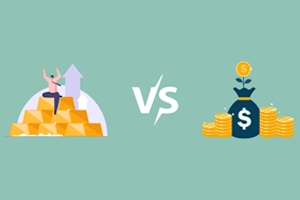
As Indians, we have always been encouraged to buy gold, whether it is for a festival or a special family occasion. However, in the modern era, while buying gold remains a cherished tradition, the way we invest in it has evolved. Today, there are two prime ways to invest in gold - gold mutual funds (MFs) and gold exchange-traded funds (ETFs). So, which one should you choose in the battle of gold MF vs gold ETF? Let’s find out.
What are gold mutual funds?
Gold mutual funds are schemes that pool money from various investors and primarily invest in gold ETFs. In addition to these, there are also thematic gold funds, which invest in gold-related securities, such as shares of gold mining companies.
What is a gold ETF?
A gold ETF is a financial tool that tracks the performance of gold and invests directly in gold with a purity of 99.5%. With ETFs, investing becomes both simple and efficient as they are traded on stock exchanges just like shares. Moreover, you can invest in them without having to physically own gold.
Gold fund vs a gold ETF - To find out the better option between these two, you need to know more about the benefits of each.
What are the advantages of investing in gold mutual funds?
- Ease of investment: Investing in gold mutual funds is simple and hassle-free. You do not need a Demat or trading account to get started. You can invest online through the fund house’s website or through third-party platforms, which makes it accessible for everyone.
- Low minimum investment: Gold mutual funds let you dip your toes in with as little as Rs 1,000. A low investment threshold makes it a great choice for beginners, such as students and young professionals or those on a tight budget.
- Systematic Investment Plans (SIPs): Another great feature of gold mutual funds is that they allow you to invest via an SIP. SIPs allow you to invest small but regular amounts, either weekly, monthly, quarterly, or annually. This offers you more flexibility in your investment strategy.
Read more - SIP In Gold: Features & Benefits
What are the advantages of investing in a gold ETF?
- Easy investment and redemption: Gold ETFs are highly liquid. Investing in gold ETFs is as simple as buying stocks. Since they are traded on stock exchanges, you can buy or sell units as per prevailing market prices anytime during trading hours.
- Low risk: Gold ETFs come with minimal risk. These instruments are backed by physical gold with a purity of 99.5% to ensure safety and transparency. This is a significant advantage when comparing ETFs vs. physical gold since they are backed by 99.5% pure gold. In contrast, physical gold may carry risks of adulteration if bought from unreliable sellers.
Read more - Gold and Silver ETF FoF vs Physical Gold and Silver
- Low costs: Gold ETFs are quite cost-effective. There are no entry or exit loads, which makes them a wallet-friendly option for most investors.
Gold MF vs gold ETF – Which is better?
Both gold mutual funds and gold ETFs provide a convenient way to diversify your portfolio and gain exposure to high-quality gold without the hassles of buying and storing physical gold. They also come with the added advantage of professional fund management. However, there are some key differences between the two to consider:
- Minimum investment: Gold mutual funds allow you to start with as little as Rs 1,000, which makes them accessible to smaller investors or those with a lower risk appetite. In contrast, the minimum investment for gold ETFs is typically equal to or greater than the current market price of a gram of gold. This can be very high for some people.
- SIP option: If you prefer disciplined, regular investments, gold mutual funds can be an ideal choice, as they allow you to invest through SIPs. Unfortunately, this option is not available for gold ETFs.
- Liquidity and redemption: Gold ETFs offer greater flexibility and liquidity than mutual funds. Since they are traded on stock exchanges, you can buy or redeem them during trading hours with ease. While redeeming gold mutual funds is also quite straightforward, it usually takes longer compared to ETFs.
- Demat account: You need a demat account to invest in gold ETFs. There is no such requirement for gold mutual funds.
Ultimately, the better option depends on your investment priorities. Gold mutual funds are a great choice if you value the ease of regular investments through SIPs. However, if liquidity and flexibility are more important to you, gold ETFs might be the better fit. The method of investment could make all the difference, so you must choose what aligns best with your financial goals.
Conclusion
Understanding the benefits and differences between gold mutual funds and gold ETFs can help you decide which option aligns with your financial goals and investment style. If you are still unsure, consulting a financial advisor can also be helpful in making the right choice.
An investor education initiative by Edelweiss Mutual Fund
All Mutual Fund Investors have to go through a one-time KYC process. Investors should deal only with Registered Mutual Fund (RMF). For more info on KYC, RMF and procedure to lodge/redress any complaints, visit - https://www.edelweissmf.com/kyc-norms
MUTUAL FUND INVESTMENTS ARE SUBJECT TO MARKET RISKS. READ ALL SCHEME-RELATED DOCUMENTS CAREFULLY
Trending Articles
MUTUAL FUND INVESTMENTS ARE SUBJECT TO MARKET RISKS, READ ALL SCHEME RELATED DOCUMENTS CAREFULLY.















